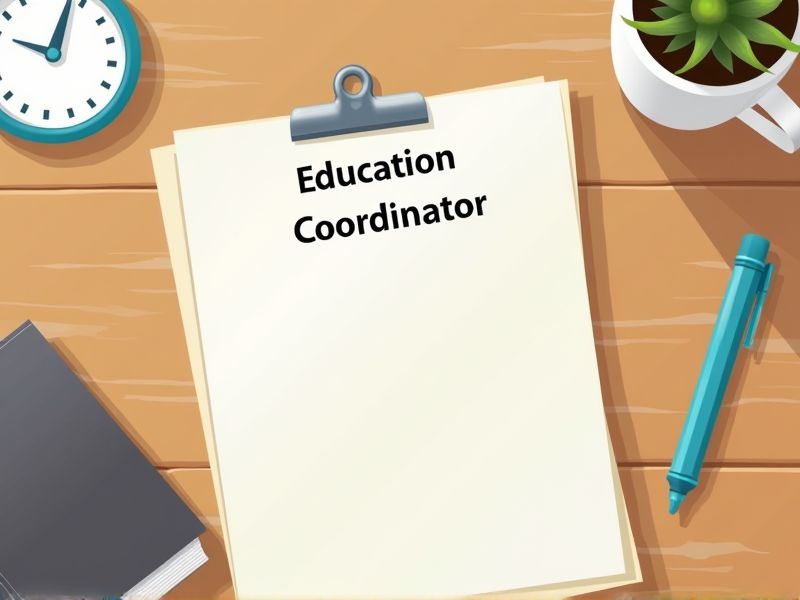
An Education Coordinator plays a pivotal role in managing educational programs and ensuring compliance with educational standards. Certifications provide credibility, demonstrating both specialized knowledge and a commitment to ongoing professional development. In an increasingly competitive field, these qualifications can differentiate a candidate and align them with specific industry requirements. Below are key certifications that could be necessary for an Education Coordinator.
Certified Professional in Learning and Performance (CPLP)
An Education Coordinator with a Certified Professional in Learning and Performance (CPLP) certification tends to design and implement effective learning programs, as the certification emphasizes evidence-based practices. CPLP certification enhances a coordinator's skills in assessing educational needs, which leads to more targeted interventions. The credential also validates the ability to evaluate and measure learning outcomes, ensuring that educational initiatives meet organizational goals. With a CPLP, an Education Coordinator often stands out in their field, increasing opportunities for career advancement and leadership roles.
ATD Associate Certification in Talent Development (ACTD)
The ATD Associate Certification in Talent Development (ACTD) verifies an Education Coordinator's expertise in key areas of talent development, enhancing their credibility. This certification provides practical tools and frameworks that can improve program delivery and learner engagement. Earning the ACTD equips coordinators to align educational programs with organizational goals more effectively. It offers a competitive edge in the job market by showcasing a commitment to professional growth and proficiency in modern educational practices.
ISTE Certified Educator
An ISTE Certified Educator ensures that an Education Coordinator is equipped with cutting-edge digital teaching strategies that align with modern educational standards. Certification enhances the coordinator's ability to implement technology-driven curricula that effectively engage students. The recognition validates the coordinator's proficiency in integrating innovative tools to improve learning outcomes. This expertise supports schools in meeting state and national educational technology benchmarks.
Google for Education Certification
Google for Education Certification equips an Education Coordinator with essential digital skills that enhance curriculum delivery. This certification validates the ability to effectively deploy and manage digital tools, promoting efficiency in educational environments. Certified coordinators can lead training sessions, fostering a culture of technological integration among staff. Access to a community of educators and resources further supports continuous professional development.
Microsoft Certified Educator (MCE)
The Microsoft Certified Educator (MCE) certification ensures an education coordinator can effectively integrate technology into the curriculum, enhancing teaching and learning experiences. Having the MCE credential demonstrates the ability to leverage Microsoft tools to improve educational outcomes and streamline administrative tasks. This certification aligns with global teaching standards, providing educators with a framework to develop 21st-century skills among students. Education coordinators with an MCE credential often lead in adopting technological solutions, fostering a culture of continuous improvement and innovation in educational settings.
National Board Certification for Professional Teaching Standards
Achieving National Board Certification for Professional Teaching Standards often leads to enhanced instructional skills, which directly impact student learning outcomes. Certification processes require educators to demonstrate their expertise and commitment to teaching, fostering a higher standard of education within their institutions. School districts frequently recognize board-certified educators, resulting in increased opportunities for leadership roles such as Education Coordinator. The rigorous evaluation demanded by certification ensures educators are continually improving and staying current with educational practices, which enhances their ability to design and implement effective curricula.
Certified Instructional Designer (CID)
The role of a Certified Instructional Designer ensures that educational programs are structured effectively, boosting student learning outcomes. By integrating evidence-based instructional strategies, CIDs enhance curriculum development, aligning courses with learning objectives. The expertise of a CID fosters consistent and scalable educational experiences, meeting diverse learner needs. An Education Coordinator benefits from a CID's skills to efficiently manage and implement innovative learning solutions.
Project Management Professional (PMP)
Holding a PMP certification can enhance an education coordinator's capability to manage complex projects effectively, as it provides a structured framework and proven methodologies. The certification equips education coordinators with skills to optimize resource allocation, which directly leads to more efficient program delivery. PMP-trained coordinators often demonstrate improved risk management, minimizing potential disruptions in educational initiatives. Furthermore, the credential can enhance credibility, fostering stakeholder trust and facilitating smoother collaboration.
Certified Distance Education Instructor (CDEI)
The role of an Education Coordinator often involves developing and managing curriculum for online learning environments, which demands expertise in distance education methodologies. A Certified Distance Education Instructor (CDEI) is equipped with specialized skills to effectively design and deliver online educational content. As the demand for remote learning grows, having a CDEI ensures that educational programs maintain high standards and engagement levels. The certification also equips coordinators to address specific challenges associated with remote education delivery, fostering a more inclusive and efficient learning experience.
Prosci Change Management Certification
Education Coordinators often face the challenge of implementing new programs and policies, requiring effective change management skills to ensure smooth transitions. Prosci Change Management Certification equips them with a structured approach to managing change, minimizing resistance and maximizing stakeholder engagement. The certification provides tools and methodologies to effectively communicate changes and support staff during transitions. Enhanced change management capabilities lead to more successful educational outcomes and improved organizational adaptability.
Summary
When you obtain certifications as an Education Coordinator, you enhance your credibility and competence, likely leading to increased trust from both colleagues and students. Employers may be more inclined to recognize your value, potentially resulting in career advancement opportunities and a broader scope of responsibilities. Your expertise can foster more effective educational programs, directly impacting student success and satisfaction. Certifications may also position you as a leader in educational innovation, driving positive changes across your institution.
